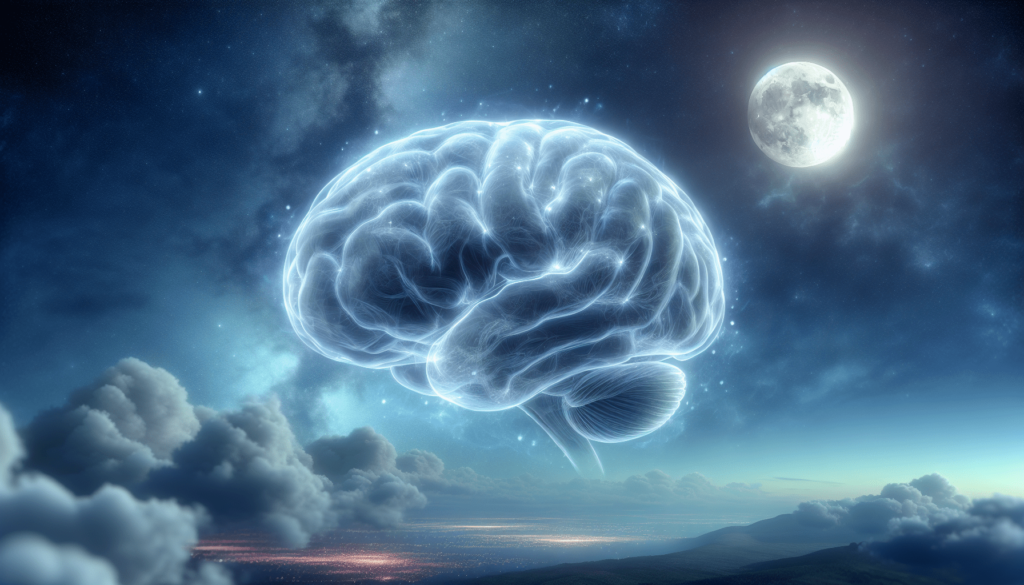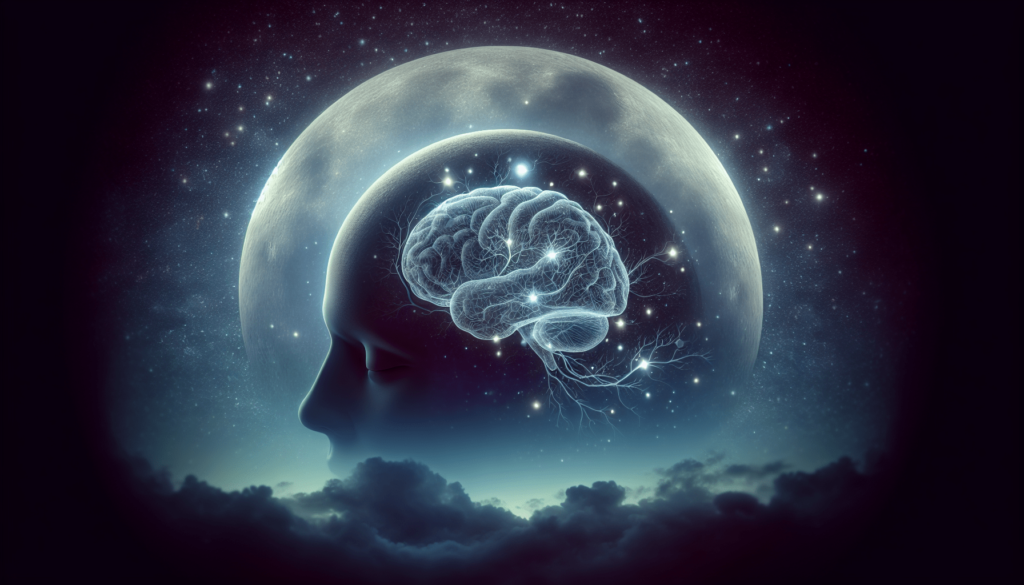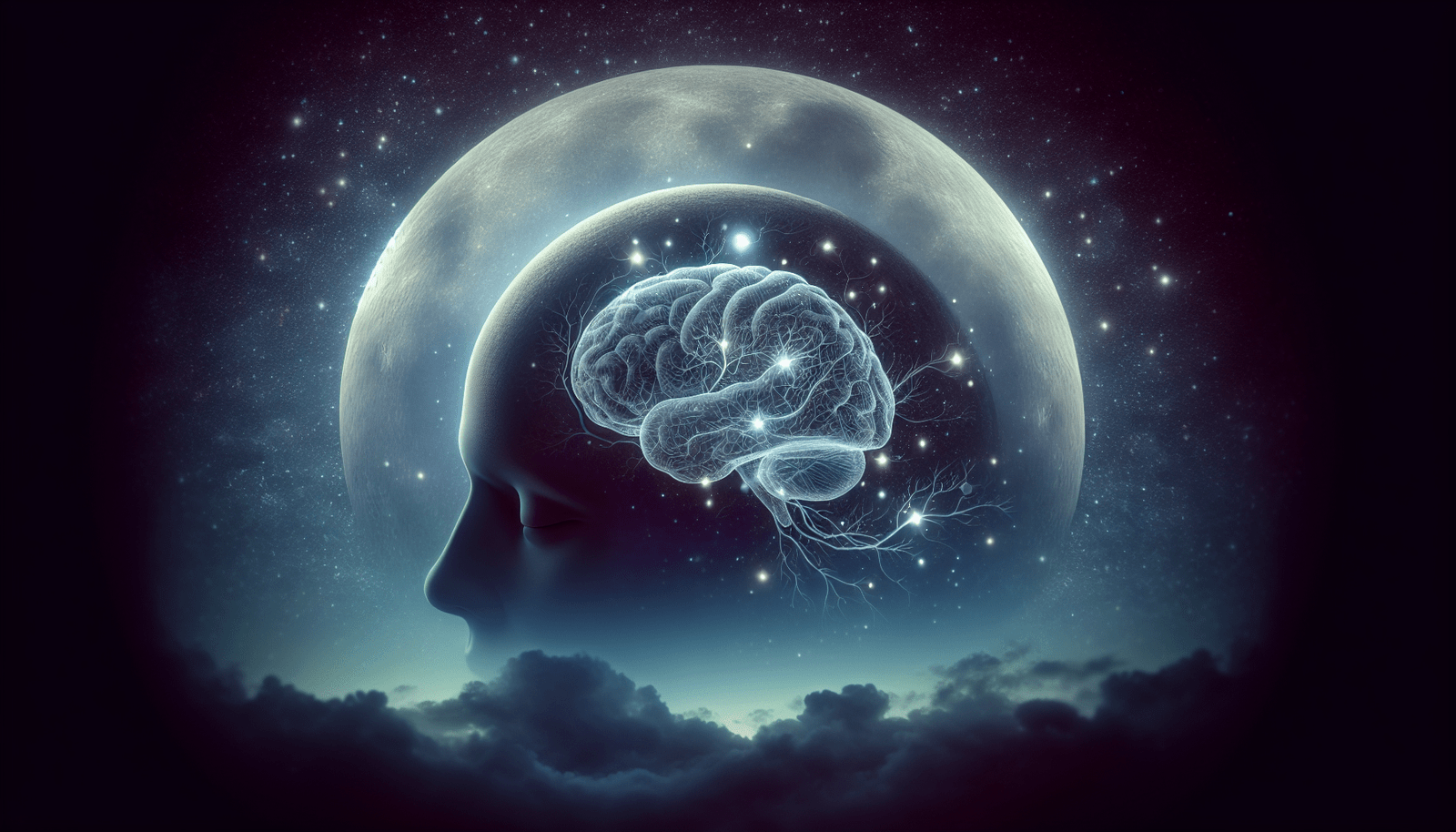When night falls and you lay down to rest, your brain embarks on a remarkable journey of rejuvenation and restoration. While you slip into the depths of slumber, a series of intricate processes take place within your brain, setting the stage for a night of blissful rest. From the consolidation of memories to the cleansing of toxins, your brain works tirelessly to ensure that you wake up renewed and ready to face the day ahead. In this article, we explore the fascinating world of sleep and delve into the mysterious happenings within your brain during this essential daily activity. So, let’s uncover the mesmerizing secrets that unveil themselves within the realm of sleep.

Stages of sleep
Sleep is not a uniform state of unconsciousness; it consists of different stages that occur in a cyclical pattern throughout the night. These stages can be broadly categorized into two main types: non-REM sleep and REM sleep. Each stage of sleep serves a specific purpose in the restoration and maintenance of the brain and body.
Non-REM sleep
Non-REM (NREM) sleep is the stage of sleep where the brain activity is relatively low, and the body is relatively inactive. This type of sleep can be further divided into four stages: Stage 1, Stage 2, Stage 3, and Stage 4. Each stage represents a progressively deeper level of sleep.
Stage 1 – Transition to Sleep
Stage 1 is the lightest stage of sleep and occurs when you first start to drift off. During this stage, your brain produces theta waves, which are slower in frequency compared to the wakeful state. This transitional stage usually lasts for just a few minutes and can be easily disrupted, causing you to wake up.
Stage 2 – Light Sleep
Stage 2 is a slightly deeper stage of sleep. It is characterized by the presence of specific brain wave patterns called sleep spindles and K-complexes. These patterns help to protect your sleep from external disturbances. During this stage, your body temperature drops, and heart rate slows down as you enter a more restorative state.
Stage 3 – Deep Sleep
Stage 3 is the beginning of deep sleep. It is often referred to as slow-wave sleep (SWS) due to the presence of slow, high-amplitude delta waves on an electroencephalogram (EEG). In this stage, it becomes more difficult to wake you up, and if you do wake up, you may feel disoriented and groggy. Deep sleep is crucial for physical restoration, growth, and repair.
Stage 4 – Very Deep Sleep
Stage 4 represents the deepest stage of sleep. It is characterized by a predominance of delta waves on the EEG and minimal brain and muscle activity. It is during this stage that your body experiences the most profound rest and regeneration. Growth hormone is released, and essential restorative processes take place. Sleepwalking and bedwetting often occur during this stage.
REM sleep
REM (Rapid Eye Movement) sleep is the stage of sleep when dreaming occurs. It is characterized by rapid eye movements, increased brain activity, and muscle paralysis. REM sleep, also known as paradoxical sleep, is an essential part of the sleep cycle and serves multiple functions.
Rapid Eye Movement
During REM sleep, your eyes move rapidly from side to side behind closed eyelids. These eye movements are thought to be associated with the vivid dreaming that occurs during this stage. Despite the brain’s high level of activity during REM sleep, the body remains in a state of muscular paralysis known as atonia.
Dreaming
REM sleep is strongly associated with dreaming, and it is during this stage that dreams are most vivid and memorable. Dreams serve various purposes, including emotional processing, memory consolidation, problem-solving, and creativity. While the exact function of dreaming is still not fully understood, it is clear that it plays a vital role in our mental and emotional well-being.
Brain Activity
During REM sleep, the brain becomes highly active. The electrical activity recorded on an EEG during this stage is similar to that observed during wakefulness. This increased brain activity is believed to be responsible for the vivid and immersive experiences we have in our dreams. It is during REM sleep that memories are selectively consolidated and integrated into our long-term memory storage.

Neurotransmitters and sleep
Neurotransmitters are chemical messengers that play a crucial role in regulating sleep and wakefulness. Several neurotransmitters are involved in the complex orchestration of the sleep-wake cycle, including GABA, glutamate, serotonin, norepinephrine, and acetylcholine.
GABA – Inhibitory Neurotransmitter
GABA (gamma-aminobutyric acid) is the primary inhibitory neurotransmitter in the brain. It helps to promote sleep and relaxation by inhibiting the activity of neurons in the brain. Medications like benzodiazepines and sleep aids enhance GABA function, increasing its sedative effects and helping to induce sleep.
Glutamate – Excitatory Neurotransmitter
Glutamate is the primary excitatory neurotransmitter in the brain. It promotes wakefulness and alertness by stimulating neurons. When glutamate levels are high, it can prevent sleep and keep you awake. Medications that block glutamate receptors can help to induce sleep and treat insomnia.
Serotonin – Regulating Sleep-Wake Cycle
Serotonin is a neurotransmitter involved in regulating the sleep-wake cycle. It helps to promote wakefulness during the day and is converted to melatonin at night, signaling the body to prepare for sleep. Low levels of serotonin are associated with insomnia and other sleep disorders.
Norepinephrine – Alertness and Arousal
Norepinephrine, also known as noradrenaline, is a neurotransmitter that promotes wakefulness, arousal, and alertness. It is responsible for the fight-or-flight response and helps to keep you awake and focused during the day. Medications that increase norepinephrine activity can help treat excessive sleepiness and narcolepsy.
Acetylcholine – REM Sleep
Acetylcholine is a neurotransmitter involved in various functions, including REM sleep regulation. During REM sleep, acetylcholine levels in the brain increase, leading to the activation of the brain regions involved in dreaming and memory consolidation. Medications that affect acetylcholine can impact REM sleep and dreaming.
Brain regions and sleep
Multiple brain regions play important roles in the regulation of sleep and its various stages. These regions work together to coordinate the timing and quality of sleep and ensure the proper functioning of the sleep-wake cycle.
Hypothalamus – Sleep-Wake Regulation
The hypothalamus is a small but powerful region of the brain that plays a vital role in the regulation of sleep and wakefulness. It contains several nuclei that produce and release hormones, including melatonin, which helps to regulate the sleep-wake cycle. The hypothalamus also receives input from other brain regions and adjusts the overall level of arousal and sleep drive.
Pineal Gland – Melatonin Release
The pineal gland is a small gland located deep within the brain. It is responsible for the production and release of melatonin, a hormone that helps to regulate the sleep-wake cycle. Melatonin is released in response to darkness and helps to signal the body that it is time to sleep. Light exposure inhibits melatonin production, promoting wakefulness.
Pons – REM Sleep Regulation
The pons is a brainstem region involved in the regulation of REM sleep. It contains nuclei that generate and coordinate the complex pattern of brain activity, eye movements, and muscle paralysis characteristic of REM sleep. Damage to the pons can disrupt REM sleep, leading to sleep disorders such as REM sleep behavior disorder.
Thalamus – Sensory Signal Filtering
The thalamus acts as a relay station for sensory information traveling to and from the brain. During sleep, the thalamus filters out most sensory signals, preventing them from reaching higher brain regions and waking you up. This filtering helps to maintain the integrity of sleep and prevents external stimuli from disrupting the sleep cycle.
Amygdala – Emotional Processing during Sleep
The amygdala is a key brain region involved in the processing and regulation of emotions. During sleep, the amygdala continues to function, processing emotional information and incorporating it into memory consolidation and emotional regulation processes. Sleep disturbances can disrupt these processes, leading to emotional dysregulation and mood disorders.
Changes in brain activity
During different stages of sleep, there are noticeable changes in brain activity that can be observed through electroencephalogram (EEG) recordings. These changes reflect the underlying neural processes that occur during each stage and contribute to the overall quality and function of sleep.
Electroencephalogram (EEG) Patterns
EEG is a technique that measures and records electrical activity in the brain. It provides valuable information about the different stages of sleep and the characteristics of brain waves during each stage. Different stages of sleep have distinct EEG patterns, allowing researchers to identify and analyze these stages.
Slow-Wave Activity in Deep Sleep
During deep sleep stages, particularly Stage 3 and Stage 4, the EEG shows high-amplitude, slow delta waves. These slow waves reflect synchronized neuronal activity and indicate a state of deep restorative sleep. Slow-wave activity is associated with physical restoration, growth, and memory consolidation processes.
Increased Brain Activity during REM Sleep
In contrast to the low-frequency delta waves observed in deep sleep, REM sleep is characterized by a high level of brain activity. The brain waves during REM sleep resemble those observed during wakefulness, with fast and desynchronized electrical patterns. This increased activity is believed to facilitate memory consolidation, emotional processing, and dreaming.
Memory Consolidation
One of the essential functions of sleep is memory consolidation, the process by which memories are strengthened and organized in long-term storage. Both slow-wave sleep and REM sleep have been implicated in different aspects of memory consolidation. Slow-wave sleep plays a crucial role in consolidating declarative memories, while REM sleep is more closely linked to the consolidation of emotional and procedural memories.
Effects of sleep deprivation
Sleep deprivation, whether acute or chronic, can have detrimental effects on both the brain and the body. Lack of sufficient sleep can impair cognitive function, mood, weaken the immune system, and increase the risk of developing chronic health conditions.
Impaired Cognitive Function
Sleep deprivation can significantly impact cognitive function. It impairs attention, working memory, decision-making, and problem-solving abilities. Lack of sleep hinders creativity, logical reasoning, and the ability to learn and retain new information. Prolonged sleep deprivation can lead to cognitive decline and an increased risk of developing neurological disorders.
Mood Changes
A lack of sleep can have a significant impact on mood and emotional well-being. Sleep-deprived individuals are more likely to experience irritability, mood swings, and increased emotional reactivity. Chronic sleep deprivation has been associated with an increased risk of depression, anxiety, and other mood disorders. Conversely, sufficient and restful sleep promotes emotional resilience and stability.
Weakened Immune System
Sleep plays a vital role in maintaining a robust immune system. During sleep, the body produces and releases cytokines, proteins that regulate immune responses. Sleep deprivation disrupts this process, leading to a weakened immune system and increased susceptibility to infections, inflammation, and chronic diseases.
Increased Risk of Chronic Health Conditions
The long-term consequences of chronic sleep deprivation can extend beyond cognitive and emotional impairments. It has been linked to an increased risk of developing chronic health conditions such as obesity, diabetes, cardiovascular disease, and certain types of cancer. Sleep deprivation disrupts hormonal balance, impairs metabolic processes, and contributes to chronic inflammation.
The glymphatic system and sleep
The glymphatic system is a recently discovered waste removal system in the brain that operates primarily during sleep. It plays a crucial role in clearing waste products and toxins from the brain and maintaining its overall health and function.
Clearance of Brain Waste
The brain produces waste products during normal daily activities, including the accumulation of harmful substances like amyloid-beta, a protein implicated in Alzheimer’s disease. The glymphatic system acts as a lymphatic system for the brain, flushing out these waste products and ensuring their proper clearance. The efficient operation of the glymphatic system relies heavily on the quality and duration of sleep.
Glymphatic System Activity during Sleep
The glymphatic system is most active during sleep, particularly during deep sleep and REM sleep. During these stages, the flow of cerebrospinal fluid within the brain increases, facilitating the clearance of waste products and promoting the exchange of nutrients and molecules necessary for brain health. Sleep disturbances and sleep deprivation can disrupt the glymphatic system’s function, leading to the accumulation of waste products and an increased risk of neurodegenerative diseases.
Importance of Sleep for Brain Health
The glymphatic system highlights the crucial role of sleep in maintaining brain health. Sufficient and restful sleep allows for proper waste removal, restoration, and repair processes in the brain. Chronic sleep disturbances, including conditions like sleep apnea or insomnia, can impair the glymphatic system’s function and contribute to the development of neurodegenerative disorders.
Sleep disorders and the brain
Sleep disorders are conditions that disrupt the normal sleep-wake cycle, leading to difficulties falling asleep, staying asleep, or experiencing restful sleep. These disorders can have a significant impact on brain function, cognition, and overall well-being.
Insomnia
Insomnia is a sleep disorder characterized by difficulty falling asleep, staying asleep, or experiencing restful sleep. It can be caused by various factors, including stress, anxiety, medications, or underlying medical conditions. Insomnia disrupts sleep architecture, impairs cognitive function, and negatively affects mood and overall quality of life.
Sleep Apnea
Sleep apnea is a sleep disorder characterized by repeated pauses in breathing or shallow breathing during sleep. It can be caused by blocked airways, muscle relaxation, or central nervous system dysfunction. Sleep apnea can lead to fragmented sleep, excessive daytime sleepiness, cognitive impairments, and an increased risk of cardiovascular disorders.
Narcolepsy
Narcolepsy is a neurological disorder characterized by excessive daytime sleepiness and sudden uncontrollable episodes of falling asleep. It is thought to be caused by a dysfunction in the brain’s control of sleep-wake cycles. Narcolepsy can disrupt daily functioning, impair cognitive performance, and lead to mood disturbances.
Restless Legs Syndrome
Restless Legs Syndrome (RLS) is a neurological disorder characterized by unpleasant sensations in the legs, often accompanied by an uncontrollable urge to move them. These sensations are typically worse at rest, especially during the evening and night. RLS can significantly disrupt sleep, cause significant discomfort, and lead to daytime sleepiness and impaired quality of life.
REM Sleep Behavior Disorder
REM Sleep Behavior Disorder (RBD) is a sleep disorder characterized by the loss of muscle atonia during REM sleep, resulting in individuals physically acting out their dreams. This can involve talking, shouting, punching, or kicking during sleep. RBD often disrupts sleep, poses a safety risk, and may be an early sign of neurodegenerative disorders such as Parkinson’s disease.
Sleepwalking
Sleepwalking, also known as somnambulism, is a sleep disorder characterized by complex behaviors performed during sleep. Individuals may walk, talk, prepare food, or engage in other activities while asleep. Sleepwalking occurs during the deeper stages of non-REM sleep and can pose a safety risk. It is more common in children but can persist into adulthood.
Sleep and brain development
Sleep is particularly important for proper brain development and functioning, especially during infancy, childhood, and adolescence. Different stages of sleep and sleep patterns play vital roles in brain maturation, learning, memory consolidation, and overall cognitive development.
Infant Sleep Patterns
Infants have different sleep patterns compared to older children and adults. They spend more time in REM sleep, which is believed to contribute to brain development and sensory processing. The sleep-wake cycle of newborns is highly irregular, gradually organizing into more consolidated periods as they age.
Sleep and Learning in Children
Sleep plays a crucial role in children’s learning and memory processes. Sufficient and high-quality sleep enhances attention, information processing, and memory consolidation. Regular sleep patterns, including consistent bedtimes and adequate sleep duration, are associated with improved academic performance and overall cognitive development in children.
Teenagers and Sleep
Teenagers often face unique challenges when it comes to sleep. Biological changes during adolescence, combined with societal demands and lifestyle factors, can disrupt sleep patterns and lead to insufficient sleep. Sleep deprivation in teenagers has been linked to poor academic performance, mood disturbances, increased risk-taking behaviors, and compromised overall well-being. Establishing healthy sleep habits during this critical period is crucial for optimal brain development and functioning.
In conclusion, sleep is a complex physiological process that involves different stages and requires the coordination of various brain regions, neurotransmitters, and neural networks. Each stage of sleep serves distinct functions in the restoration, consolidation, and maintenance of brain health. Sleep disturbances, such as sleep disorders or sleep deprivation, can have a detrimental impact on brain function, cognition, mood, and overall well-being. Prioritizing healthy sleep habits and seeking medical attention when necessary are essential for maintaining optimal brain health and promoting overall well-being.
